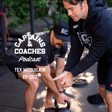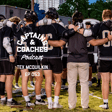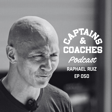The Archery Analogy: Limited Chances and Practice
00:00:00
Speaker
You know, going back the archery thing, give somebody three arrows and and you have them shoot and you see how accurate they are. And then you give them one arrow. Be like, yeah, one time, one chance.
00:00:10
Speaker
Because that's real life. Like a lot of times you got one chance. The arrows, the three arrows, those are the practice that you get to have. That's a privilege. You got to practice three times. That's great. But the game, you get one f***ing arrow. What are you going to do with this one arrow? There's no other chance. Not this week.
00:00:25
Speaker
And you talk about delayed gratification because like right now, if you miss, guess what? You just put another arrow and try again right away. You lose that game on Saturday or Friday or Saturday. You got to wait a whole nother week. You got to live a week as a loser.
00:00:36
Speaker
You got to practice a week
Introduction to Judd Leinhart and His Journey
00:00:37
Speaker
as a loser. That sucks. Yeah.
00:00:41
Speaker
Welcome to another episode of the Captains and Coaches podcast where we explore the art and science of leadership through the lens of athletics and beyond. I'm your host Tex McCoolkin and today we are joined in studio by Judd Leinhart, a man whose journey defies the conventional path to coaching excellence.
00:00:57
Speaker
From a small town kid who did not start on his high school team to becoming an all-conference collegiate linebacker, US s Army Ranger, and now one of the most innovative performance coaches in the country, Judge's story is a masterclass in resilience and
The Mass Method: Integrating Battlefield Experiences
00:01:11
Speaker
As the architect of the Mass Method, Judge has transformed how we think about movement, athleticism, strength, and speed. Drawing from battlefield experience and athletic disappointments, he's developed a coaching philosophy that uncovers hidden potential in every athlete he works with.
00:01:27
Speaker
Get ready for a conversation that challenges conventional wisdom and reveals how shared struggle becomes the foundation for extraordinary performance. Tune in if Judd helps us raise game.
00:01:39
Speaker
Ready, ready, and go. Some of the best content out there in terms of education, just getting the the juices flowing for movement ideas. and then truly anchored in application, which is is the name of the game. Oh man, that means a lot coming from you. do yeah A lot of theory, a lot of practice, and then a lot of people that don't apply anything that then step up and try to tell you how to do your job when you're out there, an experienced collegiate athlete, into now training and in unlocking athletic potential for not only young men, but also adults out there who want to still continue to always be an athlete.
00:02:15
Speaker
Yeah, no, I actually appreciate the people, you know, in the comments. you I sometimes come off as a little rude or like I'm pissed off, but, you know, it's it's really a chance to have discourse and they bring up common sentiments and it it gives me a chance to address it. So I'm grateful for that too.
Judd's Football Journey and Community in Missouri
00:02:30
Speaker
Yeah, and then it helps you flesh out your ideas further of where was there in a misinterpretation. Now let's walk through it. Yeah, and to be fair, a lot of those same notions I had as well when I was a younger athlete and coach. you know like I didn't come out you know with these viewpoints. you They developed totally over time.
00:02:48
Speaker
Yeah, and that that that's what I want to cover is is that time, that journey. So take us back, ah high school football player, collegiate football player, Army Ranger. This this has been a long journey, and I know you had an experience it within high school listening to some previous interviews where it wasn't the starting job.
00:03:06
Speaker
football College football was not in sight. Right. Yeah, so you know I grew up in a town called Louisiana, Missouri, which if you're familiar with that area, um you might know where it is. But um it's about an hour and half north of St. Louis, kind of in the middle of nowhere on a river. So, you know, we had 2000 people in the town. i lived outside of that town. And then we had 36 kids on our entire football team.
00:03:27
Speaker
Wow. So, you know, everybody played. Still 11 on 11? Yeah. So everybody played both ways. You know what i mean? um And then so we just didn't looked at a lot. We had a really good conference for small schools, but a bunch of country boys or some good athletes there. and We just got overlooked lot because it's just not, you know, and you have to understand it. It's not worth a recruiter's time to go out. And and first of all, the distance is traveled because a scout for a team or a recruiter they need to be able to sometimes go to two or three games in one day.
00:03:53
Speaker
And it just wasn't worth their time to come out there to see us in person because it's much different recruiting process back in the day. They didn't have huddle and things like that. no um So I was very fortunate that we happened to play one slightly ah larger school in a ah kind of an urban area. And the the coach from a Division Two that was going there to see some other kids saw me play. So it was just just fortunate, now you know, and then sending the old VHS tapes. I got like a walk on offer from Mizzou and some other Division Two offers. But yeah It was very fortunate because, you know, no one from my school had gone, had gotten received a college scholarship in over a decade.
00:04:27
Speaker
Wow. You know, so um it's just a different environment
Confidence Building Through Competitive Play
00:04:30
Speaker
than where we live now. Much different. Yeah. yeah so And that that sparked that college opportunity and dream for you to then take that next step?
00:04:39
Speaker
Yeah. so you know, taking a step back a little bit, I think it was my i guess it was my junior year. I was invited to the All-Star Game in Missouri, you know, and they invite kids from all different classes. And it's just it's like an inferiority complex because I knew these kids from these bigger schools were much better than me. But when I had a chance to get there and actually go head to head with them, it gave me the confidence to know that I could play against some of these kids.
00:05:03
Speaker
And then I had that again when I went to Truman State. So even though it's a division two, you still get there and these kids are still big, strong, fast athletes. And I was very intimidated because most the kids that came in with me were from larger urban schools,
Influence of Coaches on Personal Development
00:05:16
Speaker
5A, 6A, Allstate.
00:05:18
Speaker
And i I had to overcome those insecurities um and to and believe in myself that I could do it, and which was very challenging. And then speaking to both the high school and the college coaching experience, how did your coaches communicate to you to instill that belief?
00:05:35
Speaker
Like i like to call it self-leadership. Did you have that throughout experience growing up or did high school coaches start to instill that? And create a spark. So my high school coach was actually fantastic. He was for what you would expect from a small school. He was well ahead of his time as far as strength and conditioning went.
00:05:53
Speaker
Lots of plyometrics and ballistics and periodization, things like that. Better than I experienced in college even. And better than a lot of the current programs that I'm familiar with now. Head coach leading the strength as well.
00:06:04
Speaker
Yeah, that he's track coach. You know it P.E. coach, track coach. it is. Like, drive a bus if you need him to. yeah Sometimes he would drive the bus to the track meet. And he was very encouraging. And he's the coach that I tell a story all the time. we had a lift-a-thon sort of bench pressing, right? the ah the The high schoolers were. And I was in middle school at the time. I think I was in seventh grade.
00:06:24
Speaker
And at the end, they ah to raise money for charity, they invite some of the younger younger kids down. And I'll never forget, I benched plus 115 pounds. And he the coach spotted me. And to me, in a small town, he's like a god, right? Like the high school kids were benching over 200. That seemed impossibly strong to me.
00:06:39
Speaker
um i You know, I didn't know. I think I was sure all the starters on varsity in Louisiana were going to go pro. You know what I mean? I couldn't understand why they didn't. And, you know, so I benched that 115 pounds and I got up and I didn't know how and he slapped me on the back. He said, you're pretty strong.
00:06:54
Speaker
And it like clicked. I'm like, I'm pretty strong. And it changed my trajectory from then on. In my mind, I was strong. I could do it. I didn't have any limits. And I became in my mind strong.
00:07:04
Speaker
And so I needed to start acting like a strong guy. You know, and so it' it's just a reminder of like how important words are, small phrases that he probably forgot long ago, good and bad. It can either set a kid on the right path or and I carry that forward with me in my coaching community or in my coaching career
Leadership and Servant-First Approach
00:07:20
Speaker
so that I was always very aware, cognitive of the words that came out of my mouth to individual athletes. You could be tough on him and he was tough and and and you can criticize them and this and that.
00:07:31
Speaker
But don't say anything, let anything come out of your mouth that's going to make the kid not and want to believe in himself. You know, and then your job is to get, show this kid that you believe in him and that he should believe in himself.
00:07:46
Speaker
And that's what my head coach was always really good at. He gave me, you know, there's a special number that all the best players wore. Right. 54, like the all all state linebackers that they'd had there. And he gave that number to me my sophomore year after I'd earned it my freshman year.
00:08:01
Speaker
He gave he brought called me the coach in the coach's office and he explained the history of that number, explained who wore it, explained how much of an honor it was, and that I had to live up to it. So it's small things, one-on-one interactions to let kids know the history, the lineage, and the expectations of you.
00:08:18
Speaker
Mm-hmm. I like that. That's a very transformational coach versus a lot of transactional, especially at the high school level, trying to hold on to their job. So is that stuff, you know, um and then in college, the coaches did a really good job of, you know, telling me like, hey, i was a little raw, as could be expected, but they They saw potential, and the coach that recruited me said he expected me to be an all-conference player for them one day.
00:08:45
Speaker
And in my mind, he set the expectation. So knowing that, knowing when I was on that field with these kids from other schools, I know he didn't tell every kid that. you know And it gave me the confidence. Well, if the coach thinks this is in me, then it helps me with that confidence. But also, it gives me something, and once again, that I have to live up to. If the coach expects me to be all-conference, I'm going to acting like an all-conference You know, um so I would start looking at the other former returning all conference players. How do they act? How do they eat? How do they train?
00:09:13
Speaker
How do they communicate with their teammates? Because that's what I'm that's what coach thinks I'm going to be. That's what I need to start learning how to be. Observation. That's that's a skill. So where do
The Role of Self-Awareness and Observation
00:09:22
Speaker
you feel observing came into play?
00:09:25
Speaker
Because most people, they they just take the words and they don't have that social awareness. Right. is It's difficult to even teach teenagers and college athletes self-awareness. but you have self-awareness and a level up to now seeing the the team around you.
00:09:40
Speaker
That's a tough one to answer, man. I would just say if you don't have it's going to be very hard to be a successful in life. um And I see it all over. you know We were in foreign countries and when I was in the Army, and me and some other guys who have completely different experiences and see the same things. Yeah.
00:09:54
Speaker
You know, they would see people that beneath them that live like animals. i would see people that are struggling, doing the best they can, to put myself in their place. What would I be like if I was raised in that environment? it's It's just, and everyone wants to be this fitness star or influence or whatever.
00:10:08
Speaker
And I'm like, unless you spend a lot of time thinking before you're talking and wondering and listening to other people and being interested in other people, like truly interested, you're going to not be a very good influencer because you're not going to have anything to say to people other than your own experience.
00:10:21
Speaker
from your own point of view, you know? And so our experience, our abilities to experience things are quite limited. So we have to wonder, be curious, we have to research, and we have to be able to put ourselves in positions that we're not in with a clear mind so that we don't have to directly experience those things in order to learn from those things, you know?
00:10:42
Speaker
I don't know how to tell somebody to
Transitioning From Cockiness to Confidence
00:10:45
Speaker
get it sometimes, if but if you don't have it, you should develop it. that The older we get, the more difficult it is to develop self-awareness, yeah which is wild. So then a big part of this podcast is communicating to adults and leaders on how to get younger generations the opportunity to develop that.
00:11:05
Speaker
So... I always tell my kids because I went through it too. It's called, I call it my quarter life crisis. It's like my mid to late twenties when I realized I didn't and know everything because you know, yeah you take a couple to the chin, you fail a couple of times, you maybe get fired or demoted or, you know, chastised by a boss.
00:11:24
Speaker
um If you're smart, you'll just start hearing stuff that you didn't know. And it's a hard transition for people and they lose a lot of the cockiness, but then they start to grow the confidence and it's a necessary transition. So the coaches that anybody listens to around that age or has children that age, if they're going through that, just say, hey, this is a good period. This a period of growth.
00:11:44
Speaker
You know, these are lessons learned and you're just now truly starting to grow into a man. And that takes decades. Yeah. And I'm still very much in my growth process. Right.
00:11:55
Speaker
Hopefully forever. Right.
Neuro-Linguistic Programming in Coaching
00:11:56
Speaker
Yeah. The to to connect some science to the the words and what you said earlier, like it's important for coaches to i they're in a leadership role.
00:12:06
Speaker
They see a kid who's got the potential. They break them, whether through training or film or a game. And then they put them in a position to show them what the correct thing is to do versus just pile on and break them down.
00:12:20
Speaker
So the important in words and then this is called neuro linguistic programming, very famous science based term, but creating this opportunity and then almost like a mantra or a um affirmation that you are strong.
00:12:35
Speaker
So then you break them down, but you also give them the tools to build them back up. So when somebody else breaks them down, the tools are in place versus continuing the cycle to to drive them down. Yeah. And I would always say focus on their behavior, not their internal or inherent characteristics, because that is something that, you know, if they're not positive.
00:12:55
Speaker
You know, if if you see some inherent characteristics of a kid that are positive and highlight to them and let them know they have a responsibility to make the most of those. Yeah. But if you see some things they're lacking, don't tell them anything. Just just point out the behaviors that they're doing.
00:13:12
Speaker
You know, like, hey, this behavior is not what we want. It doesn't mean you are like this. you know
Turning Practice into Opportunities
00:13:18
Speaker
Yeah. they They made a mistake. They are not a mistake. You are not. You are not the sum total of your mistakes.
00:13:23
Speaker
Yeah. d And then that's that strength of observation. You can see these kids and you're not necessarily labeling them. You're helping them realize that there is growth. They're high school boys. They're going to make mistakes.
00:13:35
Speaker
Yeah, for sure. So growing up in that small town, I'm Katie, Texas, West Houston, which was a small town. Now it's yeah it's insane freaking massive. Yeah.
00:13:47
Speaker
um That's why I moved here. It represented my my small town. So growing up in that small town and then almost the self-leadership that's involved in that smaller community, how have you continued to expand that from college ball like into an army of this bigger bigger, massive machine that you became a part of?
00:14:08
Speaker
um Well, I think leadership is this thing that we don't, that isn't very well defined, but it should be. no I think we think it's this mystical quality that people possess or they don't, but there's very tangible, definable characteristics to good leaders.
00:14:22
Speaker
um I have 13 of them. Lay it on me. I don't know if I can remember all 13 offhand. I'll probably miss some, but you know, first of all, you're servant as a leader. It's not about you. It's about the success of the mission. um You know, next is you never, know,
00:14:37
Speaker
You take all responsibility, but you give all credit as a leader. Right. So if ah somebody you're leading fails, it's on you because you either chose them properly, train them properly, put them in the wrong role, you know, um that they weren't um ah what best suited for.
00:14:53
Speaker
Like all failures in the organization are leadership failures in one way or another. You have to understand that and take responsibility for that. hmm. ah Leaders are counselors. So counselors, you have to inform the people what the standard is, whether they're meeting the standard, exceeding the standard or not, and how you expect them to do that in the future.
00:15:12
Speaker
You can't fire or reprimand somebody if they don't know the standard that they need uphold to begin with. you know and you know Leaders are defined more by their actions than their words. Mm-hmm. Um, you know, leaders stay detached.
00:15:25
Speaker
So what I made me this is you have to love the people that you are serving as their leader, but you're serving the mission because the mission is going to benefit everybody. And if you get too close to the people you lead, then you won't be able to make decisions that are best for the entire group.
00:15:42
Speaker
If one of your best friends is somebody that you're leading, it's very hard for you to make, um, non-biased decisions with that's best for the whole group. Yeah. That's a few of a man. I mean, there's a lot. um But like, and it and it spans military, corporate, athletics, everything.
00:15:59
Speaker
And that's that opportunity, especially the high schoolers you're training. Like these are lessons that you're aiming to get them where it's less painful before they're in the the real world. So as a leader, first of all, you have to make your team insular.
00:16:14
Speaker
So your team is special. So it's like there's the negative connotation with indoctrination, but indoctrination is very important. It's establishing the unique lineage of the organization you're in and having people learn the history and why it's special, why they are special for being there, um why that group is special, and then what they need to do, are expected to do to be part of that special group. So you indoctrinate first.
Purpose and Motivation in Leadership
00:16:39
Speaker
And then um you train them harder, expect more, and reward them more. So you let them know that they're gonna work harder, they're gonna be the best, but they're also gonna be rewarded the best for that.
00:16:51
Speaker
And then also as a leader, you're the eyes of your team. And what I mean by that is you always see a path towards victory and you never show doubt in your victory. As a leader, you never complain about the leaders above you to the people below you ever.
00:17:05
Speaker
So if you're an assistant coach, don't ever complain about a head coach in front of your the people the your players. And if you're a player on the team, don't ever complain about the coaches to the younger players on the team. That's not what a leader does. you The complaints may be legitimate.
00:17:20
Speaker
As a leader, you complain up. You never complain down. If there are things going on that need fixed, you complain up the ladder. You don't complain about it down the ladder. latterd Because that creates doubt in people about the, you know, the chances for success in the mission.
00:17:36
Speaker
and And when it's all said and done, leaders provide purpose, direction and motivation. And you're crushing both purpose and motivation, maybe even direction if you do that.
00:17:47
Speaker
And you are fundamentally not doing your job as a leader. Mm hmm. And finally, I would say leaders develop other leaders. So if you get hurt and can't play, even if you're a football player, a team captain, and your backup can't step up and do a pretty good job, well, you failed because you didn't spend time developing your backup.
00:18:04
Speaker
You didn't invest in the next people coming through to make sure that the lineage of your team was upheld. So if you're a head coach and you get sick and your assistant coach, you know, drops the ball, you can't be like, well, my assistant coach, no asshole.
00:18:16
Speaker
You're the head coach, develop other leaders, leaders develop leaders. So, yeah. And then time and practice at the the high school level for sport coaches, the guys that are really good, leaning into them, giving everything, giving their, their 80% of their, their time and effort.
00:18:33
Speaker
and then not thinking towards the future. ah You have to identify the leaders on your team and spend extra time mentoring them about what it
Selecting and Rotating Team Captains
00:18:41
Speaker
means to be leader. Yes, leader and, however, ah i was referencing the the best players. So the best guys on the team, which isn't always necessarily the best leader of the team.
00:18:51
Speaker
Sometimes somebody will be a leader too, and it's not a good thing because purpose, direction, motivation, right? So if they are a seed in that locker room, even if they're a good player and other players look up to them and they're saying negative things about the coaching staff, negative things about those scheme, um that's an issue.
00:19:06
Speaker
And you have to address that with them. And you can't, if you can't, nip that in the bud, then you need to cut ties with that player because they can be a phenomenal player, but they can also be potentially ah toxic to a team environment.
00:19:18
Speaker
Yeah. So I want to explore this a little bit. So team captain selection, because often it's it's coaches get the heaviest weighted votes, but... the team picks the most popular guys, not necessarily the best captain for the team. So they're the best player.
00:19:33
Speaker
They're the most popular kid in school, but they're certainly not the best leader because of all the things that you mentioned earlier. They, they are faced with limitations of their own skill.
00:19:44
Speaker
So if they fail, like it's the cornerback getting burned and, you know, limping with his hamstring kind of deal. So they they protect themselves versus taking responsibility for team's action, their own play and all that.
00:19:57
Speaker
So in your opinion, what do you feel is a great way for high school football program to go through captain selection? I think it should be a combination. Players should feel like they have a vote in who leads them.
00:20:09
Speaker
And the ultimate decision is on the coach and the coach should sit down explain why. Sometimes it's easier to see things when you you sit above it a little bit and can look at it and explain the criteria to being a team captain.
00:20:20
Speaker
It's not the most likable or the coolest or the best athlete. You know, that plays into it because that gives them tools that other people will listen to them and watch them more. So that definitely helps people if they want to be a leader.
00:20:31
Speaker
right but it it goes into how you go about your business does that fit what you know the legacy of we want this team the uh what's the word i'm looking for like does it fit with what this team is looking for do do they prepare well um do they never express doubt in the success of the mission all the things we talked about and you can so explain that to your team like this is what it takes to be a leader and you know you guys voted for for this guy and we hope he gets there but right now he's just not there um And he can be a great teammate, but he has to learn how to be a good teammate before he can be a good leader.
00:21:02
Speaker
And I am hoping that the guy you voted for becomes a captain one day. Just not ready yet. You know, it's okay to be honest with your players. yeah that That's extremely important. And then, like you mentioned, you would share that with the team and the individual.
00:21:16
Speaker
the The players feel heard at the same time. They can see ah there's room to grow and aspire to. Yeah, just explain why you didn't pick those people. And maybe not single them out, but be like, there are people that you voted for that we didn't select. And those those teammates just aren't ready to be captains yet.
00:21:30
Speaker
Yeah. For these reasons. And it's a long season. It's a long season. A captain is are not a permanent thing, and they need to know that when they get that that C or whatever, you know however you are choose to designate that role. you know And captains are defined by their actions more than their words. I don't need the raw, raw guy in a locker room just preaching everybody. a lot of times the best leaders would use them to say a word, but everybody looked at them to see what they were going to do.
00:21:53
Speaker
and what they did matter. Yeah. Yeah. I spent a lot of time helping shape behavior and body language. Yeah. So body language in respect to conditioning, we're applying the psychology of discomfort and teaching them how to not rest on their knees, the hands on the head, all that, and stand tall.
Respect for Authority and Character Reflection
00:22:12
Speaker
And also if there's a decision, if coach says something, yep getting rid of that reaction. Yeah. So, you know, it's the whole, the coach doesn't like me thing. hear that so much. It's like, hmm.
00:22:24
Speaker
I'm like, why do you think he doesn't like me? And I always say that. So I get a lot of one-on-one. So I have a privilege of getting a lot of one-on-one things and creating emotive bonds with them and things like that. And so I get a lot of that. And I'm like, why do you think the coach doesn't like you? I don't know.
00:22:35
Speaker
Well, let's figure it out. Oh, it's because of my dad. it's because your dad, huh? Or something. yeah It's like, you sure, every time he gives you a workout, you sure you're first one at the line. you're sure you You sure your body language, you do look him in the eye.
00:22:47
Speaker
yeah. You know, and, you know, a lot of those same kids and people, they're like, well, they have to earn my respect. I'm like, no, they don't. Here's the thing. They're an authority figure.
00:22:59
Speaker
Whether you like it or not, that commands respect. Right. As an authority figure, they should respect you as a player. But even if they don't, that doesn't alleviate of your obligations to treat them with respect. Right.
00:23:09
Speaker
You know, ah in the, um, ah we have Ranger Creed. Part of that Ranger Creed is like, you know, my respect for superior officers. So set the standard. And because it's not about that officer, that officer might be a bag. That coach might be an idiot, but your respect for him is a reflection on you, not them.
00:23:28
Speaker
Right. Um, so treat them with respect. They're an authority figure. One day you'll be an authority figure. Right. Um, it's very important. Yeah. Time out. Feeling the weight of the world on your shoulders, actual training, getting squeezed out by life's demands?
00:23:42
Speaker
The Old Bull program on Train Heroic was built for warriors
Old Bull Program and Military Motivation
00:23:46
Speaker
like you. I create targeted six-week training cycles that systematically address knee, hip, back, and shoulder health. The foundations that keep you moving when others break. No wasted time, no unnecessary complexity, just intelligent programming that adapts to your schedule and your body's needs.
00:24:05
Speaker
Each cycle manipulates key lifts to maximize results even when time is scarce because old bulls don't stop training. We just train wiser. Whether you're managing old injuries or preventing new ones, this program keeps you powerful despite life's limitations.
00:24:21
Speaker
Start your seven-day free trial and train road by clicking the link in the show notes. Old Bull Program. Because the world needs your strength. And now, back the show. Ready, ready, and break.
00:24:32
Speaker
That last component is a is a great thing to add to that conversation. So now it's almost the, I want you to treat your coach, your captain, like you want to be treated when you're in that role in that position. Absolutely. So that's an important thing.
00:24:48
Speaker
um Sticking with the the Ranger Creed, I want to spend some time in that experience. Like that motivation to join the military, you enlisted, correct? Correct. Yeah. I enlisted, but I was off.
00:25:01
Speaker
Okay. So yeah, I was commissioned. So then, i mean, post-college, you took the opportunity to then join military. during wartime. Like speak to us on that just mental thought process kind of a sense for meaning um and just, you know, obligation. I remember there was like a pivotal moment where it's like 2005 and I was seen or six maybe I seen a film from the ah Battle of Fallujah and guys my age were over there fighting for something larger than themselves. And I was living on a beach.
00:25:37
Speaker
And just my life didn't feel like it had a lot of meaning. It's not that I agreed with the war. It's just if I didn't go, somebody else is going to have to. And we are in a big fight now and I wasn't taking part of it. And i just felt like I was obligated to do something. Yeah.
00:25:51
Speaker
And then to, to step from, i mean, into, into a ranger, you had to prepare, you had to target. That was a goal in itself. And then the, the mental, the physical preparation to get there and then execute.
Challenges of Ranger School
00:26:04
Speaker
Yeah, I mean, so as an infantry officer in the Army, you're expected to have your Ranger tab. So I knew that I was going to go to Ranger school. So if you're familiar with that, though, there's a big difference between be having a Ranger tab and being in Ranger regiment.
00:26:17
Speaker
And just getting your Ranger tab is is something that should be lauded. i mean, it's it's not easy. you know It's nothing superhuman, but it's a difficult school. oh So I knew that was coming. Then after that, I was fortunate enough that my company commander in 10th Mountain was a former Ranger Regiment guy. So the way it works is if you're enlisted, you get a Ranger Regiment, you just get to stay there your entire career. But if you're officer, you're expected rotate in and out because they want to take the lessons that the Ranger Regiment can teach an officer and then have those spread to the larger army.
00:26:45
Speaker
So my company commander had served his platoon leader time and staff time in Ranger Regiment. um So first you have to be a platoon leader in Big Army and then you go and be a platoon leader and staffer in Ranger Regiment.
00:26:56
Speaker
And then you're a company commander in Big Army and then you go back and forth, right? And he was getting ready to go through the selection process. Again, you have to go through the selection process every time you want to go back in. And he asked if anybody wanted to go and I, you know, and then you have to, you know, submit a packet and then and they screen out before you go. So you have to be certain level of intelligence and PT scored a certain amount. So have this pre-screening.
00:27:18
Speaker
um And then it's just you go through a selection course, which isn't extremely hard. I mean, if you're prepared for it, you know. but just shooting standards and knowledge standards and everything else.
00:27:29
Speaker
But then once you get there, you're a newbie in Ranger Regiment and your preparation isn't over and your hard lessons learned aren't over and you have to continue to develop to meet their standards. And I was not ready when I got there. I had some hard lessons that some of which I learned and some of which I wish I would have learned better, you know?
00:27:49
Speaker
So it's a phenomenal organization. And then, so we can spend some time with, you said something, once you get there, that's a similar experience from high school. I signed my letter of intent, but once I get there with the the army, as you mentioned, once you get there, and then in life, once I get a job or I become a head coach, goals are just beginning.
Continuous Learning and Self-Improvement
00:28:13
Speaker
So it's not just a matter of getting accepted and being in that position. So how can you help educate and empower younger athletes to understand Like, oh, now you've signed that letter of intent.
00:28:25
Speaker
I can lean into you more. So the goals just begin. It's not just even in fitness and weight loss. It's not just reaching the goal. oh That's the journey just began. Yeah, you're always growing.
00:28:36
Speaker
So when you get there, have confidence in yourself. they the You're there for a reason. People believed in you for a reason. They weren't wrong. You belong there. But you are not a fully grown plant yet.
00:28:48
Speaker
You know, they saw the seed of potential in you. And now you have to suck up some nutrients. And what that means is you have to look at those that are doing it right in the organization.
00:28:59
Speaker
And don't think you know everything and don't try to reinvent the wheel. There'll be a time when you're a veteran that you can look at things and be like, hey, we might be able to do this. That is not the time. You're a sponge. You look at and you copy.
00:29:09
Speaker
You do exactly what they do. Right. And you'll learn if you can do a better in time, but for, and then ask questions, ask good questions, you know, like, um, and just more importantly, just keep your mouth shut and watch other people.
00:29:22
Speaker
You'll learn a lot just from watching. Yeah. Yeah. Again, coming back to observation observation. Yeah. So, so now what are some behaviors or actions with the younger kids you're training that you see that you're able to call out and try to shape that behavior that you see that,
00:29:40
Speaker
you've you experienced once in life as a younger athlete, ah young soldier, young professional in the career. Like, what are some common behaviors you got to help shape? I could talk about this forever. So we'll start with the commonalities. And this is not just high school kids, but everybody.
00:29:55
Speaker
There's three things I look for accountability, resiliency and gratitude. So if you're not in a place you want to be, i always listen to like, are they taking accountability for that? is it because they didn't prepare hard enough or or they didn't set the stage or are they blaming other people?
00:30:10
Speaker
And I have to address that. And then gratitude, be grateful for the things in their life that got them there because it makes them appreciative. um and And it also feels like they're not entitled to it. They have to earn up to these gifts that have been, they have to live up to these gifts that have been given to them.
00:30:25
Speaker
And then just resiliency. You know, we're all going to have setbacks. And then I just see how they handle those setbacks. And I try to reframe their mindset, depending on the situation, to look at it a different way.
Building Athletes Through Setbacks and Appreciation
00:30:35
Speaker
There's lots of injuries and lots of time on the bench and, you know, how to make the most of that time. And what can we learn from this stuff?
00:30:42
Speaker
You know, like you can learn a lot when you turn ACL about how hard it is to come back. And usually players come back better from that. And I always tell them like most the time, I know you're frustrated now, but we've done this before. You're not the first player with an ACL injury.
00:30:56
Speaker
It's a very tough time. And I understand that, but you're going to learn a lot of things and you're going come back as a better player. And you're going tonna be grateful for this injury. It goes back to gratitude. Be grateful for obstacles. Right? So that's commonalities. That's not just, that's everybody. As far as high school kids, they their unique skills is they have a hard time prioritizing and understanding what needs to be their priority right now.
00:31:17
Speaker
They have a lot of passion, a lot of energy. They prioritize girls and partying and alcohol and being popular with their friends. Friends are very important to high school kids, being in that in-group, you know, and you have to really take a hard look at who their friends are.
00:31:31
Speaker
And then you have to get them to question, are these friends conducive to my larger goals? First of all, you have to ask them, what are your larger goals? What are your aspirations? And they might say D1 football or pros, or i'm like, okay, that's very important. So we will address that. But what after football?
00:31:46
Speaker
What do you want to do after football? Because you're not going to be a football player your whole life, right? Football playing is a tool that's going to make you a better man, hopefully down the road. So we address those two things and and be like, all right, these are your, the that might be your dream of a child, but is it a goal? And if it's a goal, we have to address what you're doing right now, make sure you're not closing any doors that's going to prevent that.
00:32:05
Speaker
Like getting a felony or getting a girl pregnant or, you know, something like that, or um doing something at a party that's going to get you really physically hurt, you know, irresponsible without thinking. And it's like the best way to do that is to be cautious of the environment you're in.
00:32:20
Speaker
Mm-hmm. So as a one-on-one coach, there's a lot of things you have to talk to with these kids. And a lot of times they just don't even think about it. you know and And they'll tell you if you form a bond with them and and say, hey, I was just like this at your age. They'll tell you what's going on. And then don't judge them for it. just be like well In my experience, this is what, you know, we all have those stories. I did that and this is what happened to me.
00:32:42
Speaker
Just so you know, you might want to look out for this kid, you know, like, and then go over and what makes good friends, you know, like what makes a good friend? You know, lot of them don't know, they don't think about their friends are the people that are the coolest or the funnest to be around and help their own popularity.
00:32:55
Speaker
That's not what makes a good friend. A friend is there for you when it's easier for them not to be, you know, did they pull you up and hold you to a higher standard? um Do they push you down? or And more importantly, do they sit down with you when you do something wrong and you're not popular? Do they stay by your side?
00:33:10
Speaker
Or do they create some space for themselves? like They just don't even analyze what really makes a good friend. no Yeah. And hopefully they they hold that mirror up as well. Yeah. towards the Are you being a good friend?
00:33:23
Speaker
Yeah. Yeah. Very important. Yeah. I like that. And then the the comment, what after? Because there is always an after. High school, college, athletics, everybody's athletic career ends.
00:33:35
Speaker
yeah And the important thing of where identity is important, however, at the same time, like we won't want that to define you forever and then hold on to It's always sad when you see grown men and and the peak you know they peaked in high school.
00:33:51
Speaker
But like the also that means their funnest times, their best memories were in high school. It's like, man, that shouldn't be that that way.
Delayed Gratification and Long-term Goals
00:33:57
Speaker
And maybe your best memory is in high school because you prioritize making memories then instead of setting the stage to be able to make better memories down the road.
00:34:04
Speaker
And so, you know, the kids want to do things, and I struggle those two. It's like you want they want to party. They want to spend all that time with their girlfriend. They make dumb decisions over a girl. they like They get introduced to alcohol and drugs, and they like them.
00:34:19
Speaker
um they want to work out to look a certain way instead of perform a certain way. And I'm like, it's not that these things are bad. It's just, you're going to have availability to boats and parties and alcohol and drugs and bodybuilding and girls your entire life.
00:34:34
Speaker
But you have a very small window when you can set the stage for better things that are going to let all of those things that you love right now be even better when you're more mature and can handle it.
00:34:45
Speaker
Yeah. um And it's just like delayed gratification. And it's like, hey, man, you got your whole life to party on a boat and do bodybuilding. You a very small window to just optimize everything that you have right now in order to go to a better college and get a better degree, land a better job.
00:35:04
Speaker
You know, so it's usually the people that were younger that were able to see the bigger picture and delay gratification that really get to reap those rewards that don't feel like they peaked in high school. Yes. the The fun memories, like I just had my 20 year high school reunion.
00:35:18
Speaker
we were still having the the fun memories, but they weren't necessarily the peak. It was just fun funny old football coach sayings from way back when. Yeah. I mean, and you know, it's hard to tell these guys too, because they're going to college and know, they maybe have to leave their girlfriend or their high school friends. They don't want to, and they don't believe it, but it's just like, Hey man. And they told me this thing too.
00:35:38
Speaker
The best friends you're ever going to make are going to be in college night in high school. Because you yeah yeah you can self-select a little bit more in college. There's people from all over the world. You can meet people that might not look like you would be from the same place. so You have a lot of shared affinities, um have better moral characteristics. You form a closer bond.
00:35:55
Speaker
And I still like the kids I grew up with and you know in high school. But my closest friends are friends I made in the military and in college. Because you're in a unique environment where you share hardships together.
00:36:06
Speaker
And that's what builds close friends, not partying. yeah yeah that's good note yeah double down on that college buddies for life weddings all the good stuff yeah the delayed gratification i'm sure you've heard of the marshmallow test for kids no oh oh i love it yeah you gotta check out this research simply simply put they had kids sit down and they put a marshmallow in front of them if you wait two minutes and the the researcher left the room i'm going to give you two marshmallows So then they follow these kids for 20 years to see their success. And the kids were able to wait.
00:36:39
Speaker
They had a sense of delayed gratification and were more. How old were the kids in the state? Four. Oh, it out on on YouTube. Simple marshmallow test. So then now I think of ways to test and then retest this with high school kids.
Evaluating Athlete Commitments
00:36:55
Speaker
So and holding them accountable for ah even showing up early. If it's five extra minutes to get ah a throw in or a catch in with me or, hey, meet me five minutes early tomorrow because I want to speak to you about X. Are they able to execute then?
00:37:11
Speaker
So now I can step in and try to shape the behavior. It's like, dude, I was here. that's You gave me your word. Yeah, the expectation. That's a genius, man. lot So let's try again tomorrow. Yeah, so expectations um is one, but also um helping kids visualize what it will be like, spending time visualizing what it will feel like to win conference, what will feel like to win state.
00:37:32
Speaker
Put yourself in that moment. Imagine that moment, right? Imagine the payoff if you can delay gratification. And then even taking it down a notch, spend time after the workout that was hard. And instead of sending the kids home, and be like, hey, that was brutal, but it's over.
00:37:47
Speaker
now when you're done how good do you feel you're getting better right now you you put in the price you paid the price and now you're reaping the awards for this workout i'm proud of you good job remember that tomorrow when you show up sore and you don't want to work remember it tonight when you're thinking about maybe drinking alcohol and instead of hydrating properly that you're planting seeds um that you're going to be able to harvest later so a coach had a good you know, analogy for us, it's called picking up rocks. So these dudes were in a desert and they were all hungry and thirsty and starving and thought they might die. and
00:38:21
Speaker
They found an old soothsayer there. I might be butchering it, but he's like, um here's here's what you do. You're going to be saved and in time. In the meantime, pick up every rock you can. And they thought this guy was nuts, right? and like But some people just trusted. They had faith. They're like, okay.
00:38:36
Speaker
Because they were stronger. They knew they could handle it. They knew that they could make it to that oasis even if they' were carrying a bunch of rocks. They started putting rocks in their pocket. And it was harder for them. you know They were the strong ones. And then they came over horizon and they saw an oasis there.
00:38:50
Speaker
And they're all were saved. And they went they drank water and they ate food and they they passed out, right? And they all fell asleep. And they woke up. And when they get reached their pocket, all of those rocks had turned into diamonds. And the dudes that had faith in the process and picked up the rocks and carried the heavy weight were the ones that had the diamonds at the end.
Allegory of Rocks and Diamonds: Faith in the Process
00:39:06
Speaker
They couldn't see it then. But the soothsayer could. So the soothsayer is the head coach. The soothsayer is your parents. Soothsayer are the people like, hey, to you, these are just rocks right now. Pick them in your pocket and just trust me. So as a kid, you don't have to see it.
00:39:19
Speaker
You don't have to understand it. But sometimes just have faith in people that have been there. And listen to people that are successful, like older adults. Like look at older adults that are living a life that you kind of would like to live and be like, what did you do when you were my age? And they'll tell you.
00:39:32
Speaker
and then have faith in them. It might not ne make sense to you right now, but when you wake up in that oasis and you put your hand in your pocket and you pull some diamonds, and you're like, ah, he knew what he was talking about. Yeah. the I like that. too Similar experience in rock is the the the connection here. So we did fortunate a
Retreat Reflection and Goal Setting
00:39:50
Speaker
private school. We did it like a retreat getaway team building preseason.
00:39:54
Speaker
And so it was at a ah camp that had a blue hole in. Yeah. Somewhere around yeah round wimberleyly So private property with a blue hole. Awesome experience.
00:40:05
Speaker
So we did like a ah mile trek out there. And if I saw, you know, clearing. Just do pushups or some GPP fitness. And then we get to the blue hole.
00:40:16
Speaker
And I was looking at it. I said, you know, no phones, five minutes, take time. What do you want to accomplish this season? Like, let's establish an expectation, an individual goal. Later that night, we would come back together for team goals.
00:40:29
Speaker
So then just had them sit there and think to themselves. And then there was these old men bull birdwatching or something. And I saw them like walking on the cliff above maybe 30 feet.
00:40:41
Speaker
And so i was like, oh, that'd be awesome to get up there and look. So after our our goal, we started to to run back and I saw an old archery, um just base camp, Marchery range is the word i'm looking for.
00:40:56
Speaker
So then Went there and said, all right, everybody say your individual goal. We just went around in a circle. And then the theme I had was archery. Okay, we're we're having fun. It's paintball. It's airsoft. It's archery. What do you do if you miss?
00:41:09
Speaker
Reload. Because, again, the body language, if I make a mistake, if I miss, it's like, ah, it's the end of the world. So reframed at that sense. And then as I'm ah having them share, the old men, like, walk through the archery range.
00:41:23
Speaker
So I asked them, how do we get there? And they just created their own path. So ran the boys up there. We're hanging out over the ledge. And I had them look. And I said, all right, it's the end of the season. We're now looking back on our expectations, our goals.
00:41:36
Speaker
Had them pick up a rock. And then each person shared their fear of, like, i I gave up. i stopped caring. I got injured. Whatever their fear, like weighing them down was, and just throw the rock into pool. That's awesome, man. i love it So helping them understand, like, it's okay to have those fears, but also now you need to inform us. Don't internalize it and continue to drag yourself down without vocalizing it so a lot of it too is like perspective so practices drag on or seasons drag on you know practice oh i have to go to practice no you get to go to practice this is an opportunity for you it's a fleeting one oh it's two hours long it's going to drag on no that's a short window in your day it's it's something you have to seize you only have and it's perspectives how you look at it i have to do two hours or only get two hours today to get better
00:42:27
Speaker
I ah of all day today.
Focus and Maximizing Practice Opportunities
00:42:29
Speaker
This is the two hours where I can make myself a better player. am i What am I going to do with this two hours? And that matters. And it's like, you know, going back the archery thing, give somebody three arrows and and you have them shoot and you see how accurate they are.
00:42:43
Speaker
And then you give one arrow, be like, yeah, one time, one chance, because that's real life. Like a lot of times you got one chance. The arrows, the three arrows, those are the practice that you get to have.
00:42:54
Speaker
That's a privilege. You've got to practice three times. That's great. But the game, you get one arrow. are you going to with this one arrow? There's no other chance. Not this week. And you talk about delayed gratification because, like, right now, if you miss, guess what? You just put another arrow and try again right away.
00:43:06
Speaker
You lose that game on Saturday or Friday or Saturday, you've got to wait a whole got to live a week as a loser. You've got to practice a week as a loser. That sucks. Because lot of times in life, even if you do get another chance,
00:43:18
Speaker
you know, Olympic athletes and they, up they might get back in four years. There's no guarantee. And they got to wait four years. Like that's life, you know, and you get one shot, man. What are you gonna do with it?
00:43:30
Speaker
Yeah. I like that building on the arrow analogy. That's awesome. Yeah. And the the change of perspective and go in elevation. I was thinking also dead poet society. Yeah. Yeah. love the movie. Had the kids stand on the desk.
00:43:41
Speaker
That's a fantastic movie. i I love it. It's amazing. So that, that was in my mind. was, it was is more visual. So what we're speaking on right now, you spent a lot of time, how you approach leading the mental and emotional state of individuals.
00:43:55
Speaker
And now we're spin expanding it into the teams. And just yesterday you posted awesome Lake Travis video, the dudes. So that, that that's what I love is team dynamics and how to coaches leaders lead teams.
00:44:08
Speaker
Cause it's, it's, it's a balance. If one person has a doubt, a doubt or resentment or some form of like cancerous behavior, It's got potential to drag down.
00:44:18
Speaker
But the longer we are away from season, the more important it is to stress and teach so we can identify those behaviors. So then come week four, five, six, seven, nine, ten playoffs, we're set.
00:44:31
Speaker
So now, yeah is it instinctual, your approach to leading groups?
Mentoring vs. Leading
00:44:36
Speaker
Or do you have an intentionality to it to help understand, hey, I'm training you not for game one, for game 11 come playoff time.
00:44:45
Speaker
Yeah, um you know, it might have been extinct, but that I've had to do a lot of contemplation and analyzation difference between being a mentor and being a leader. Mentor, I'm more of a mentor. I prefer being a mentor where I can form an emotive bond. I can relate to people.
00:44:59
Speaker
I can counsel them. Being a leader is far different than being a mentor. You can be both. Those very different things. Being a leader, being a mentor, you want to form an attachment somebody so they trust you and listen to what Being a leader, you want to remain distant a little bit.
00:45:14
Speaker
almost It's not a bad thing if they dislike you a little bit because even if they're bitching together about you, they're doing something together. right What you don't want is them groups of them to be bitching about other groups of them.
00:45:27
Speaker
so that's a hard thing for leaders. a Leaders don't like it when the their team talks about them. you know Let them. They're bonding. But you've got to look out, are they talking about each other? You've got to squash that. You punish them bullying and disrespecting each other. right um You let your assistant coaches punish them if they disrespect you.
00:45:47
Speaker
Because by disrespecting you, then they're disrespecting the organization as a whole. this has nothing to do with you. You, as a leader, by definition, should be replaceable. Right. You should not be invaluable to that team.
00:46:00
Speaker
That team cohesion and togetherness is
Team Cohesion and Leadership Role
00:46:03
Speaker
what's invaluable. And it's just a different perspective. It's you rise above, not not like you're better than them, but you're detached, you know, and then they trust you that you can see the vision and you can see the way you're almost like they're guiding light.
00:46:15
Speaker
And then you spread that light to the other captains. Now the captains can see the guiding light and nobody ever questions the mission or the eventual success of that mission. You know, you you know, before it happens that you're goingnna win.
00:46:26
Speaker
You know, and and that's what you have to instill. So you don't need to be as nice as a coach. You always treat your players or your employees, whoever it is, with respect. This doesn't mean you disrespect them. You don't tease them.
00:46:36
Speaker
You don't mock them. You don't belittle them. But you don't have to be their buddy. You don't have to be super nice to them either, right? um Because what you're looking for is that bonding amongst themselves. They don't need to bond to you.
00:46:48
Speaker
If you're a mentor, they do. If you're a leader, no, they didn't you're just a guy. you're You're the light. Mm-hmm. You know what i mean? um it's a di and I don't know if that's the answer you're looking for, and I could go a different route with that, but that's the most important thing is you have to establish standards that everybody knows and and and lives up to.
00:47:06
Speaker
That's the expectation. Like, I don't like this 110% It's like, hey, what's the standard? Am I meeting the standard? if if If you are, great. If you're not, that's an issue. We'll find somebody else that will. um And then get them to uphold the standard themselves because it's a pride that they have in themselves and in that standard.
00:47:23
Speaker
You know, um you are part of the team, but that team is part of you. everybody it's not about you, it's about the team. No, it's about both because you have become part of the team. So if the team succeeds, you succeed.
00:47:35
Speaker
And I always look for kids when I say, how how'd the game go last week or the competition? always look, do they say how they did or do they say how the team did? And then if they say how they did first, even though that's what I really care about is how they did.
00:47:48
Speaker
But if they say how they did first, have to reframe that. i have to be like, well, did you win or lose? Oh, we lost, but I scored six goals. Should have scored eight then, shouldn't you? You know, what could you have done different to help your team win other than just scoring goals?
00:48:01
Speaker
Why didn't other people score goals? How can you help other people score some goals? Because you can score 100 goals if you lost. Guess what? You lost. May as well scored zero, you know? And so getting them reframe that, you know and then now, now we can work on whatever you need to do to help that team with.
00:48:16
Speaker
Yeah. I, I like that. And then reframing and showing them how to respond. Now you're training them to step into leadership roles, whether they're a captain or not.
00:48:27
Speaker
So a lot of the, the, the fears, the blockers of people stepping up into leaders, I don't know I don't know what to say, or maybe the weight, the pressure, uh, responsibility.
00:48:38
Speaker
haven't, They don't want that. Yeah. It's it's finding what the barrier is. And if they're a ah me first guy, well, me first is going to it's going to help get you to the next level.
00:48:49
Speaker
But it's not going to give you the stories in the season that you truly want and are aiming for. Yeah. Like after a loss, I don't want to see kids hanging their head. But I want to see their head down a little. bit I want to see their head down in their eyes up.
00:49:03
Speaker
That's what I'm looking for. It's like, that hurts. Like, I'm not getting down on myself, but I'm not happy this week. And I'm looking up. what That's not going to happen again. So I don't want to see kids walk around happy-go-lucky after a loss. You know? I'm like, but I also don't want to see them, whoa, we's me. We suck. It's like, that didn't feel good.
00:49:18
Speaker
And that's not what this team is about. This team is not what we did last week. you know And I'm not going to forget about it yet. You know what I mean? like yeah still It still should hurt a little bit. You know what I mean? like Oh, I get it.
00:49:30
Speaker
i I feel phil field still as a coach. But then I have to shape and model the behavior, the expectation that I need of them. to Two ways that I'm approaching that. The first is is during practice. Like if I lose my temper, I'm announcing like, you guys are leading me to feel this way. I'm at a six.
00:49:50
Speaker
So I'm giving it a number and then come game time, they know, oh he's at this level, this tone, and they don't take it personally. They're not getting playing time. They make a mistake.
Emotional Control for Coaches
00:50:00
Speaker
You let them know that? Oh, yeah. yeah i This is the aim. that's I mean, I always say that's that's genius because your behavior has to be calculated as a coach.
00:50:09
Speaker
It's not that you can't raise your voice or show anger disapproval. there's There's a reason they call it losing your temper. You've lost something. You've lost control of your temper and that's going to you lose respect and you lose trust.
00:50:20
Speaker
My best mentors and coaches were always people that stayed composed. You knew when they didn't approve of something and they strategically would raise their voice and show anger and disapproval. But they were always in fully in control of their own emotions. Yeah. the What I avoid is using running as punishment. Yeah.
00:50:38
Speaker
So now have a phrase, punishment. So step in. It's a lot of pillar work and stuff where it's forced. It sucks. And it forces leaders. It gives leaders an opportunity. Forces gives leaders an opportunity to be vocal.
00:50:50
Speaker
Yeah. So holding it for three minutes, if somebody drops down, the clock stops. So find ways for guys to come together one way or another. And then ah another thing I'm just working through to educate coaches is is responsibility.
00:51:04
Speaker
But it's two words. Response. ability yeah so i like the losing your temper you lost the how it said that so now helping train my captains and the team for future captains how how to respond so archery was a part of that um but i i like the anchor like i want them to feel anger it shows me they they care uh during games it's just how are we responding is it directed at me Yeah. this That's going to be a problem.
00:51:33
Speaker
Is it direct to the refs? Also going to be a problem. No one's ever won that argument in the history of sports. No, I can't stand. And I can't stand if you're a dad. man. Do not yell at the refs in front of your kid because you're giving that kid an excuse.
00:51:46
Speaker
Keep your mouth shut. You might not like it. The head coach is yelling at the refs for a strategic reason, usually. All right. And it's to plant seeds of doubt in that ref. So then the next time, because they know human nature, the next time they're more likely to give you the call.
00:52:00
Speaker
That doesn't work with a player. If you start jawing with a ref as a player, trust me, it's going to work the opposite. yep you know And the first time a kid says, oh, the refs, was like, well, I guess you should have been better then. you know We all have to overcome. You had to overcome refs. Oh, well, it happens, right? yeah I hate the whole ref. And I hate dads yelling at refs.
00:52:18
Speaker
Or dads complaining about the coaches in front of their kids. You complain up, not down. You're a chain in that leadership, you know, and you're complaining at your kid and you're getting your kid to doubt the mission. Do you think you complaining is going to change the reality of this kid's life other than the fact you're going to get him to doubt the mission and his coaches? That's not going to help anything. No way.
00:52:37
Speaker
So now question here, and this is something I i explored as an athlete and then i witnessed this just within the the community we're living in. So now Dads aren't part of the picture.
00:52:50
Speaker
So now the coach, like whether you realize it or not, you are the the male role model. So now how how do you find out ah environment home environments with the the kids you're working with to then see how you can step in, lean in take a step back, and then just work the dynamic that they would need in hence ah in in terms of mentorship, like leaning in and separating mentor and leader?
00:53:17
Speaker
That's tough one. Um, there's not a lot you can do about that kid's home environment. Right. But if you see things that he's either not getting as far as like accountability and responsibility, you know what to hone in on to address with his time there. So you need to see what he's not getting is as bad as his dad being abusive to him and demeaning and killing his self-confidence.
00:53:39
Speaker
Is his dad comparing him to himself as an athlete? um then you need to address that in a positive way. You need to build up that kid's confidence. You need to let him know that he's not his dad and he's held to a different standard. And, you know, we all have our glory stories of our younger days. Take all that with a grain of salt.
00:53:55
Speaker
You know, these dads come in and and I electric time their kid and they run a 4.8 or something, which is pretty fast electric time. Dad's like, well, ran a 4.3. I'm like, yeah, asshole. In spikes with and hand time with a tailwind.
00:54:07
Speaker
And, ah you know, and let me see it. Let me see the tape. You know, it's like, dad, what are you doing? Like, like, why would you do that? is Is this about you? Is about your kid? That's not all this. Some dads do that.
00:54:17
Speaker
When I was your age, I was benching this. Like, good for you. Like, ah what what college did you go to again? You know what I mean? Like, oh yeah you know, I would have gone to a bigger one. and like So, you know, like that kid is going to have some of those traits just because they they model themselves after their parents. And you're going to to more mentorship for that kid because they're not getting that mentorship at home.
00:54:36
Speaker
Or is it a dad that like their kid can do no wrong and everything's somebody else's problem? You have to address that too. So you're not to be able to change their home environment, but you have to kind of change your approach to kind of compensate for the home, unfortunately.
00:54:48
Speaker
In a very limited window, one, two, three, four hours a week. Yeah, very limited. But that that limited still has more weight than that hour somewhere else. Yeah, and a kid will listen to you where they won't listen to their parents. you know and It's frustrating for parents, but it's just the nature of the beast. you The kid's going listen to his friends. He's listen to his coaches.
00:55:07
Speaker
He's not going to listen to his dad very often. um And it's frustrating for dads. Like read somewhere like after the age of 12, kids turn away from the home and they turn twenty they they still need mentorship. They turn towards other mentors more, you know. So the best you can be to your, you know, is to as a dad then is to try to set the stage so that they're around healthier mentors for one, a better friend group.
00:55:30
Speaker
ah you know Pick good coaches if you're going the private route. And also you know you try to like analyze the coaching staff on particular points to see if those are going to be good mentors for your child.
00:55:40
Speaker
Because those are who your kid's going to be listening to. you know But also just create a safe environment at the home. like Give them a chance to whine and complain without shouting them down. At the end, you need to mentor them.
00:55:51
Speaker
But you know make it so it's safe that they can come to you with stuff. yeah Don't act like you were perfect when you were their their age. And then they'll come to you because if you act like you're perfect and you judge them and you shut them down, they're still going to do that They just won't come to you. And then you're out of their life and you have no control.
00:56:05
Speaker
Right. You know? Yeah. That response, responsibility for the father. Like if they come to you for, ah if they have a problem and then they sit, they,
00:56:18
Speaker
You know, say, well, back in my day, or I didn't do that, or toughen up. It's not how do I respond. It's just, it's closing the door. A lot of dads, especially moms too, but they feel like if they tell stories of the youth where they weren't perfect or they failed, it's going to undermine their credibility to their son.
00:56:35
Speaker
And that's not how it works. Your kid loves you and he's going to look up to you. He's going to look up to you by what he sees you do now, how you treat the mom, how you treat your other siblings, how you approach your job, how you talk to other men.
00:56:47
Speaker
He sees everything. You're, for you know, verbally to him, one of the best things you can do is tell him lessons you learned when you were his age, because then he can relate to you.
00:56:57
Speaker
And then he sees himself in you. So it's almost, it's not the same, it's almost as if he's making those mistakes. You made those mistakes for him. Don't be like, when I was your age, I did this. isn't When I was your age, i did something really stupid. Like, tell them about the time you got a DUI.
00:57:10
Speaker
I drank a lot at a party and I drove home drunk and I got a DUI. could have killed somebody. And this is what happened. I didn't start that day. Or or and when I was your age, I got a girl pregnant or whatever it is. You know, like, don't be like, hey, and I was stupid and I wish I could change it, but I can't.
00:57:25
Speaker
You know what I mean? um Tell stories that you aren't proud of. You know, I tell stories to my kids all the time, the times I made stake and how I wish I could go back and change it. But the only way I can change that now is to learn from it myself and pass on that, those hard lessons learned to other people that will listen to me.
00:57:42
Speaker
Leaning into now I can understand differentiating mentor and leader and then that the team environment as
Accountability in Leadership
00:57:49
Speaker
well. So now winding down for.
00:57:53
Speaker
the, I think it's important to now, how do we punish teams for individual mistakes? What would be your approach? First of all, you punish a leader. So every team needs have a leader hierarchy within that team, people that they're responsible for. So I don't like hazing, but I like rites of passage and I don't like putting all the freshmen in one group, you know, and,
00:58:13
Speaker
I think every upperclassman should have somebody that they mentor and that they're responsible for. And, you know, you can be hard on this kid and you can punish them to some extent. But if you see that kid getting bullied or hazed, you step in, you're his big brother, you protect him.
00:58:28
Speaker
Hey, so-and-so, so this is so-and-so, and you're in charge of protecting him and developing him because he's your legacy. right If he doesn't do well, if you come back in three years and the team sucks, it's your fault. You're not only responsible for how the team does while you're here.
00:58:42
Speaker
I'm holding you responsible for how the team does after you leave. And that depends on how well you develop these younger players. So they're there to mentor and teach, and they're there to protect the younger ones instead of bully them, right? Because they're going to treat whoever comes next how they were treated by you. yep you know So when there's a failure, an individual fail, well, who's your leader?
00:59:01
Speaker
and then make that kid stand there and you punish the leader. And they're like, now, if i if I catch you bullying this kid because you didn't do your job, I'm gonna punish you again. You mentor him in a way as a leader that's going to get him so he doesn't make that mistake again.
00:59:15
Speaker
Right. It's not about bullying. It's about teaching. Right. So and a lot of times it's like it's not you need this kid to do push ups and burpees. Hey, sit there and watch six hours of film with me, because if if the guy that you're leading failed, you fail, too.
00:59:31
Speaker
And you get punished together and you both sit there and watch film. You know what I mean? Like, yeah, I would hold not group punishment, but leader punishment. So in in good organizations, like who's up? Who's his leader?
00:59:42
Speaker
You You know what i mean? Why did why did he up? You know, and then they guess what? People don't you know, like not nearly as much. Think about that. If you were a kid, if you're like, man, if I miss this tackle, my mentor is gonna be pissed at me.
00:59:55
Speaker
Right. Because I let him down. Right. But you only get to be a mentor, though, if we can create a bond with that kid. So if you step in as a senior junior, you're just dick to this freshman.
01:00:07
Speaker
You're not his mentor. You're just another boss. Yeah. You have to form a bond with him. He has to know that you're going to be hard on him, but you're also going to protect him. You're also going to teach him. You're going to take him under your wing and develop him. And then he's driven by a positive motive, not a negative one. I don't want to miss his tackle because I don't want to let my mentor down.
01:00:23
Speaker
Yeah. Right. um So I think and and it's something that just doesn't go on. I wish it did. Like, why are we hazing still? Rites of passage are very important, but we go through those together. Yeah. um And I don't know why there's not more mentors designated. It's not going to happen on its own.
01:00:38
Speaker
It's like every varsity player, every star should have a kid that they're mentoring, an apprentice. Yeah. yeah And that's the, I mean, relationship building. They're also learning how to lead because they're A big, especially with high school boys, is they don't know their tonality.
01:00:53
Speaker
So they they're saying the right words, maybe. But then it comes off as being a jerk. So then coaches, they're in help shape, how to elevate and change their tone. Yeah. And at the end of the day, don't worry about the words you say. I know I'm big on talking and I love to hear myself talk. But really, what you do matters way more.
01:01:12
Speaker
Just do the right thing. That's being a leader. Just first, do the right thing. Yeah. yeah You don't want to leave room for the freshmen and then bark back because you're asking what you wouldn't do. That loses us all credibility.
01:01:23
Speaker
Yeah. Yeah. The well, cool, man. You shared a lot of your experience, your stories, and I value that. And again, the the content, the education you're putting out.
01:01:34
Speaker
It's so much fun, just the creativity and then truly application. ah Where can people go to continue to learn? We got ah Instagram, we got podcast. And then what's the future that holds that's local here?
01:01:48
Speaker
Yeah, so Judd Leinhart is my name. And so you can find that if you just, ah if you write that into Instagram or or on YouTube now, we've put out a little bit of longer form and the podcasts are on there as well.
01:01:59
Speaker
But the podcasts are Instagram. you know, Apple and Spotify and everything else as well. So we're only nine episodes into the to the podcast and it delves into a lot of the topics we talked about today. oh People that succeeded in a lot of different areas despite their challenges.
01:02:15
Speaker
um And then what's next is we we're building out a studio in downtown Austin, and we're going to do podcasts from there, um collaborate with other great minds in the field, and put out more content from there. And then hopefully, you know, a book is on the way sometime shortly.
01:02:30
Speaker
um Just talking about Mass Method, which is movement, athleticism, strength, speed. It's just a way to pass some of the specific knowledge that I've been exposed to, to more of a general population because they deserve to be athletes too. Mm-hmm.
01:02:43
Speaker
pretty much it. What I appreciate about authors, you're you're capturing your ideas, you get the opportunity to leave this legacy and then discover more. So you're not just trapped so telling the same story.
01:02:55
Speaker
So once that book comes out, now you're going to start to seek more and then share more experience. So excited for that. ah I'm a big avid reader. So appreciate that. And I appreciate your time coming out to to Dripping Spring. So thank you. Thank you brother. All right. Thank you for having me on. Thanks for our listeners.
01:03:12
Speaker
We'll see you next time. Bye. Thank you, brother. Appreciate it. Yes, sir. See you.




















